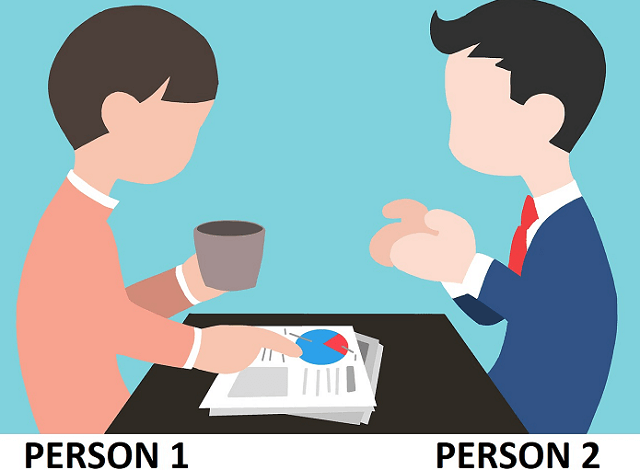Business Communication DefinitionBy definition, "business Communication refers to the exchange of information, ideas, and opinions within an organization or between organizations and their stakeholders, including customers, suppliers, shareholders, and the public". The goal of business communication is to facilitate effective decision-making, build relationships, and achieve organizational objectives. It includes a range of communication methods, including nonverbal, written, spoken, and electronic. Clear, concise, precise messages that are adapted based on individual audiences and delivered through proper channels to the intended audience are essential to effective corporate communication. 
What is Business Communication?Effective communication is a critical component of success in the business world. In fact, it is essential for businesses to communicate effectively both internally and externally in order to achieve their goals and objectives. Business communication encompasses various modes of communication, such as written, verbal, electronic, and nonverbal communication, all of which play a vital role in achieving organizational success. Perhaps, the most typical method of corporate or business communication is writing. Emails, memos, letters, reports, as well as other written materials that impart knowledge, concepts, and instructions fall under this category. Clear, succinct, and well-structured written communication makes it easier for the reader to understand the content. Also, it is crucial for businesses to think about their target audience and modify their message accordingly. The accomplishment of corporate goals and objectives depends on effective communication. Strong connections with clients, vendors, shareholders, as well as other stakeholders, may be forged with the proper assistance and communication. It can also enhance teamwork, resolve conflicts, and facilitate effective decision-making. Companies should work to create successful communication plans that include a variety of media, are suited to the target market, and are distributed through the proper channels. There are several key principles that can guide effective business communication. Firstly, it is important to consider the audience and context when communicating. This includes understanding the knowledge, interests, and motivations of the audience, as well as the social and cultural context in which communication is taking place. Another crucial method of corporate communication is speech, particularly in face-to-face conversations. This can include meetings, presentations, and phone calls. In these situations, it is important to speak clearly, use appropriate tone and body language, and actively listen to the other party. Effective verbal communication skills can help build relationships, resolve conflicts, and enhance teamwork. Types of Business CommunicationIn the corporate world, effective communication is crucial for success. It includes a range of communication methods, including spoken, written, electronic, and nonverbal, all of which are essential for establishing organizational success. Developing effective communication skills is crucial for individuals and organizations alike and can help build strong relationships, enhance teamwork, and achieve business objectives. Let us discuss a few notable communication methods in detail: Verbal CommunicationThis type of communication is delivered through spoken words and is often used in face-to-face meetings, phone calls, video conferences, and presentations. It allows for real-time interaction and feedback and can help build coordination and/ or understanding between parties. Written CommunicationThis type of communication is delivered through the written word and is often expressed in the form of emails, letters, reports, memos, and other written documents. Written communication provides a permanent record of the message and allows for careful consideration and revision of the message before sending. Nonverbal CommunicationThis type of communication is delivered through body language, gestures, and facial expressions. Nonverbal communication can convey emotions, attitudes, and intentions and can influence how a message is received. Visual CommunicationThis type of communication is delivered through visual aids such as charts, graphs, diagrams, and other visual aids used to communicate data and information. Visual communication can help simplify complex information and make it easier to understand for the readers. Electronic CommunicationThis type of communication is delivered through digital channels such as text messages, instant messaging, and social media platforms. Electronic communication allows for quick and efficient communication and can help overcome the barriers of distance and time zones. Formal CommunicationThis type of communication follows a structured format and is used for important business matters such as contracts, policies, and procedures. Formal communication often follows a specific protocol and requires careful attention to detail. Informal CommunicationThis type of communication is more casual and non-structured and often takes place in a business environment, such as between colleagues or during breaks. Informal communication can help build relationships and create a positive work environment. External CommunicationThis type of communication takes place when the business communicates with customers, suppliers, and other external stakeholders. It is important for building and maintaining relationships with external parties and can impact a business's reputation and success. Internal CommunicationThis type of communication is done within a business organization, such as between employees, departments, and managers. Internal communication is important for coordinating efforts, sharing information, and maintaining alignment and consistency across the organization to achieve shared goals and objectives. ConclusionIn conclusion, effective business communication is essential for success in today's fast-paced and globalized business environment. It involves the exchange of information, ideas, and opinions between individuals or groups within an organization. It typically encompasses various forms of communication, such as verbal, nonverbal, written, and electronic communication. Effective communication skills are critical for individuals and organizations to make informed decisions, build strong relationships, and navigate the complexities of a global business environment. Clarity and conciseness should be prioritized while communicating, and both should be suited to the target audience and circumstance.
Next TopicBusiness Ethics Definition
|
 For Videos Join Our Youtube Channel: Join Now
For Videos Join Our Youtube Channel: Join Now
Feedback
- Send your Feedback to [email protected]
Help Others, Please Share










